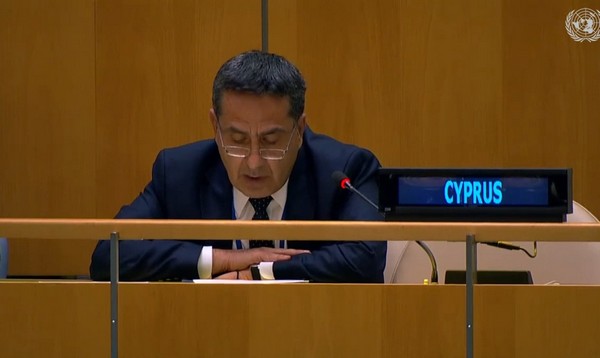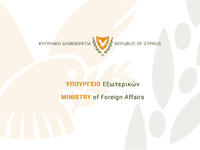Press Releases

07-12-2021 09:13
Statement by the Permanent Representative of Cyprus to the UN, Ambassador Andreas Hadjichrysanthou, on the Return or restitution of cultural property to the countries of origin
6 December 2021
The protection of cultural property has long been a priority for Cyprus, given its rich historical, cultural and religious heritage as well as the loss of a very significant amount of our cultural property since well before our independence as a state.
At the outset, I wish to express our sincere appreciation to the delegation of Greece for once again presenting the Resolution on the “Return or restitution of cultural property to the countries of origin”, which we have traditionally cosponsored.
The pillaging of and illicit trafficking in cultural property has always had epidemic proportions. What we now witness, however, despite our significant advances in the normative framework for the protection of cultural property, is the deliberate destruction of unique monuments of global historical and cultural significance. As an international community, we have proven incapable of stopping that, as much as we have proven ineffective in preventing the unacceptable, arbitrary alteration of the status of ecumenical cultural and religious landmarks.
While such actions culminate in uprooting the cultural and ethnological connection of the local populations from their lands, they are not only directed against the people of the country where they are perpetrated but are against our shared history and the cultural identity of humanity as a whole.
Much like trafficking in arms or drugs, illicit trafficking of cultural property now constitutes a global industry. The growing dimensions of this crime compel us to redouble our efforts to combat it, both within and between states, both in armed conflicts and in times of peace. Whether or not we succeed in better protecting cultural property depends on wide‐reaching changes in attitudes. Illicit trafficking in cultural property is a crime against all of us, not just the specific civilization or country whose heritage is vandalized.
The effective implementation of the international legal framework is a sine qua non for the success of our efforts. The resolution we are adopting today is a positive step in that direction, as it contributes to bridging the gap between legislation and cooperation at the domestic and the international levels.
As a long-time victim of having incredibly large numbers of artifacts of historical, archaeological and religious significance pillaged and stolen, Cyprus has been struggling for many years to trace and repatriate its cultural property. In the last four decades alone, more than 60,000 cultural and religious objects of immense historical value have been looted from Cyprus’ occupied areas and sold in black markets all over the world – under international law, the responsibility for their return rests with the occupying power.
While we remain dedicated in locating and repatriating our stolen treasures, this is not a battle we can fight alone and we continue to rely on the efforts of other states and on robust international cooperation.
As a result of our own experiences, Cyprus has always sought to contribute effectively to international efforts on combatting illicit trafficking and ensuring the repatriation of cultural property. It is for this reason that Cyprus took the lead in concluding the Nicosia Convention, a unique universal mechanism to protect the common cultural heritage of humanity and the only international treaty aiming to prevent and combat cultural property crimes by providing for their criminalization. The Nicosia Convention can be instrumental in international efforts to address legal gaps with regards to the prevention and prosecution of trafficking in cultural property. We invite all UN Member States to consider acceding to the Convention.
At the same time, we welcome other significant developments in the international arena. UN Security Council Resolution 2347, adopted unanimously in March 2017, was a historic milestone in the international efforts to protect cultural heritage. We would have liked to see additional work by the Council, following up and building on this important resolution. It is important for the Council to be consistent, even if its members that championed an issue are no longer serving on the Council.
Equally important is the emergence of relevant case law. The landmark decision of the International Criminal Court in the Al Mahdi case in 2016, paves the way for more efficient enforcement of international justice with respect to cultural heritage crimes. Bringing such cases to justice serve to enhance public awareness on the seriousness of international cultural heritage crimes.
The protection of cultural heritage is an obligation that touches many areas of our work at the UN: peace and security, sustainable development, and human rights. The destruction of cultural heritage and the illicit trafficking of cultural property not only impair the preservation of collective history and the safeguarding of cultural identity, but hinder the realization of economic, political and social rights and the development of a global civic society. We need a more integrated approach through the establishment of multilevel mechanisms on a local, regional and global scale, leading to a system of global governance for the protection and enjoyment of cultural heritage.
EH/ECHR
Relevant Press Releases

19-04-2024 16:42
PIO e-mail Αlerts service is suspended

15-04-2024 14:04
The Ambassador of Cyprus to South Sudan presented her credentials

14-04-2024 12:45
Statements by the President of the Republic


11-04-2024 19:20
Official visit of the Foreign Minister of Andorra to Cyprus


